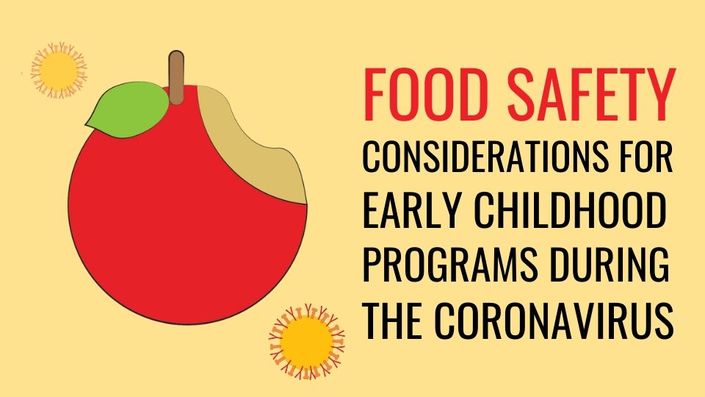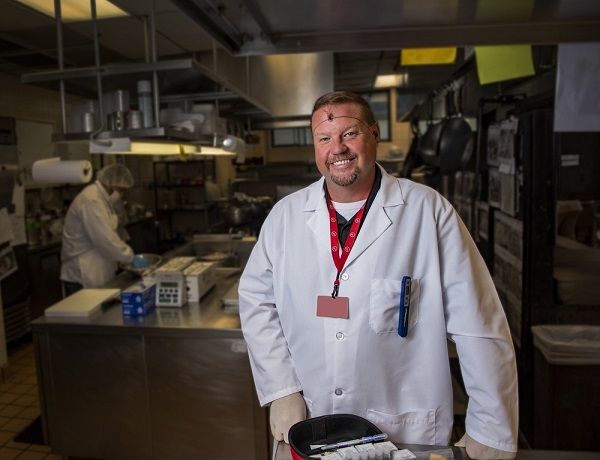

PLEASE NOTE: Google Chrome Internet Browser works best to access the courses and content. If you are having issues, please try Google Chrome as your Internet Browser.
Course Time: 1.5 Hours
This Course Is Free For Coronavirus Training Bundle Members. Purchase the Coronavirus Training Bundle Today: Click Here!
Food safety is of paramount importance. Each day millions of children are away from home, receiving care from early childhood professionals. It is important to ensure our early childhood workforce understands the basics of food safety, especially since studies estimate that children receive 70% of meals while away from home.
Further, children under 4 years of age are 4.5 times more likely to acquire bacterial infections from food compared to adults – making safe food handling practices essential. Through a mix of slides, graphics, live videos, and real-world scenarios, this course will provide early childhood professionals with knowledge of food safety practices designed to minimize the potential for contamination and food-borne disease outbreaks.
The coronavirus pandemic has complicated daily life. This course will also examine food safety practices in light of the coronavirus pandemic and provide concrete actionable solutions you can implement today to enhance the health and safety of your program.
Learning Goals and Objectives:
- Discuss proper handling techniques for potentially hazardous foods.
- Identify the types and causes of foodborne illness, best practices, and how to minimize the chances of a foodborne outbreak.
- Identify safe food handling practices in the early childhood setting.
- Describe the basic principles of food storage and preparation.
- Discuss the importance and basic elements of food safety in the childcare setting.
- Discuss actionable steps that can be implemented to reduce the likelihood of transmission during the coronavirus.
- Describe at least two ways that programs should modify food service during the coronavirus pandemic.
- Identify at least two risks that are present due to the coronavirus pandemic.
- Describe the risks associated with cooking food onsite, obtaining food from a catering company, and having children bring food from home.
Your Instructor

David Banaszynski serves as an environmental health officer, where he works each day to protect his community from illness and disease. His work includes inspecting food establishments, child care facilities, public pools, and a myriad of other businesses to ensure they are operating in compliance with public health rules and regulations. Mr. Banaszynski also serves as a member of the State Board of Health and as past-president of the Illinois Environmental Health Association. Mr. Banaszynski has over 20 years of expertise as an environmental health officer and collaborates extensively with other organizations, such as the Centers for Disease Control and Prevention, the National Environmental Health Association and the Illinois Department of Public Health.
Core Competencies Standards
We know that every state has its own set of standards and protocols regarding statewide training and professional and career development courses for the early childhood community. Our online training courses were researched, developed, and designed with input from early childhood professionals, child care providers, directors and administrators, early childhood learning institutions, Child Care Resource and Referral Agencies, Head Start and Early Head Start programs, public health professionals, public policy experts, emergency management, and law enforcement.
During our on-site training, we seek professional guidance and feedback from early childhood professionals. Our online courses reflect this feedback, and we aim to provide early childhood professionals with the latest and most informative core competency learning standards. We do not expect early childhood professionals to be emergency preparedness experts, therefore our online training courses provide skills, abilities, qualities, and actionable tips and policies. Our training enables early childhood communities across the country, so they can serve the children in their care and provide a safe and prepared environment.
Who Are These Online Training Courses For?
Early childhood professionals have an awesome responsibility. Not only do they provide a caring environment for infants, toddlers, and children, but they also must provide a safe and secure environment. Our online training courses provide early childhood professionals with resilience, confidence, and a strong learning foundation to protect children in an emergency or natural disaster.
We know that the needs of the early childhood community are very specific. That’s why we designed our courses to meet the needs of early childhood professionals, those that care for infants, toddlers, and children, Child Care Resource and Referral organizations, parents, teachers, child care providers, directors and administrators, and early childhood learning institutions.
All the topics that we cover in our online training courses are approached in a safe and calm manner. We aim to address the specific needs of the early childhood community, and we wholeheartedly agree that children should be allowed to learn, grow, and dream without the threat of aggressive preparedness policies. During our online training courses, we never call for unannounced drills or simulated violence of any kind. Instead, we provide actionable ways for child care providers to teach children about emergency preparedness, response, and recovery in a developmentally age-appropriate way.
Assessments and Student Accountability
Our online training courses keep students actively engaged and eager to learn. We have designed our courses with a learn at your pace approach; students can start and stop courses at their convenience, go back and re-learn or refresh course topics, and students also have access to the online courses for one full year from the time of purchase.
Our teaching approach is warm, calm, and respectful, and we make sure no student is left behind. With a mix of slides, graphics, videos, and other creative visuals, students feel empowered, focused, energetic, and ready to learn. We have framed our coursework to meet the needs of the early childhood community, making sure that everyone can participate and put our practices to use in a child care setting. Because our courses make participants feel empowered and confident, students have the desire to continue learning and building upon each lesson in our online course catalog.
Time Awarded for Online Training Courses
Upon the successful completion of each online training course, participants are awarded a certificate of completion. Each certificate states the name of the student, course minutes, name of the course, and date the course was completed. The time awarded for the course is equal to the amount of time used to complete the course.
Course Curriculum
-
PreviewIntroduction and Overview (3:13)
-
StartBasics of Food Safety (12:49)
-
StartFood Allergies and Temperatures (17:35)
-
StartCoronavirus Considerations (18:47)
-
StartRestarting Your Program (12:58)
-
StartFrequently Asked Questions (17:19)
-
StartKnowledge Check
-
StartDownloadable Resources
-
StartColoring Contest
Frequently Asked Questions
Learn more about our offerings and check out all of our early childhood resources: The Institute for Childhood Preparedness.
